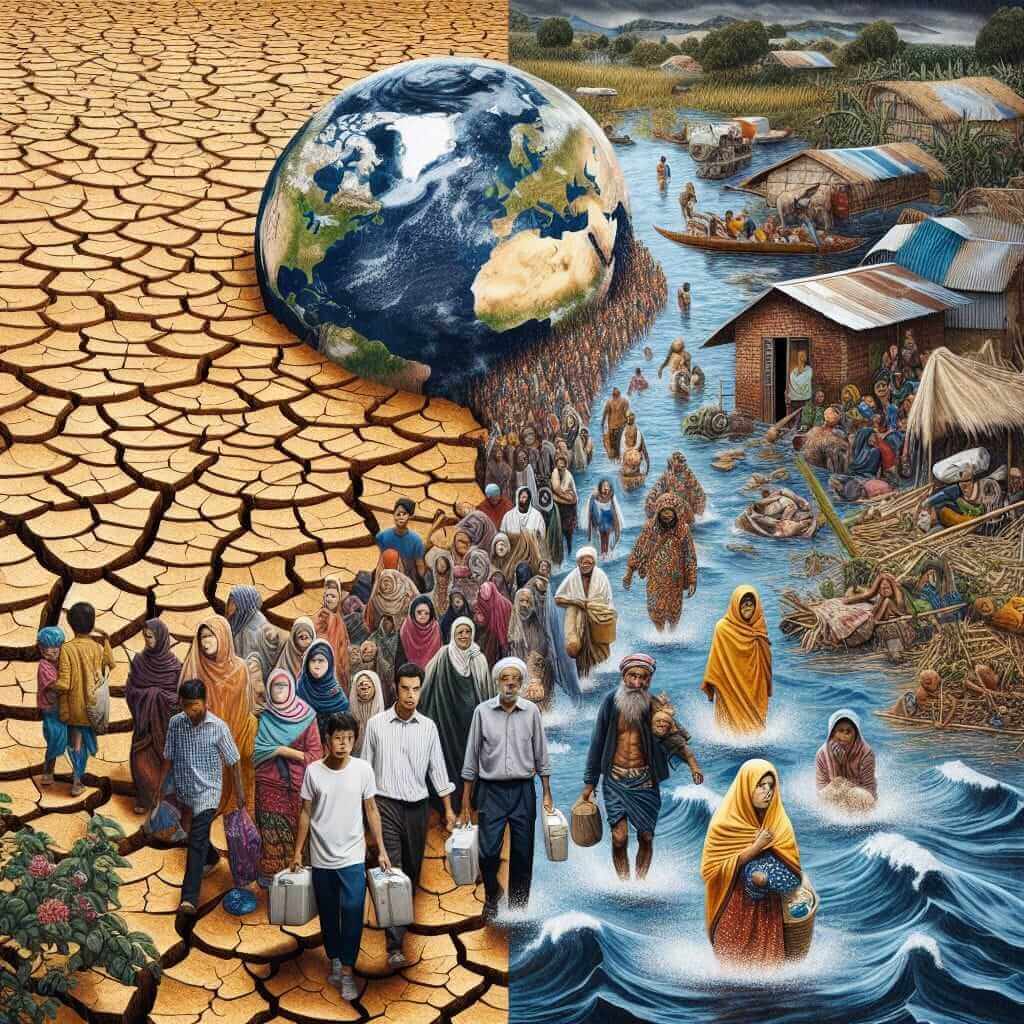“The effects of climate change on global migration patterns” is a pressing issue frequently appearing in IELTS Writing Task 2. This topic delves into the complex relationship between environmental changes and human displacement, examining how rising sea levels, extreme weather events, and resource scarcity are reshaping global population movements.
This comprehensive guide provides valuable insights for IELTS test-takers aiming to master this topic. We will analyze common essay prompts, dissect a model essay, and equip you with the necessary vocabulary and grammar to achieve a band 8+ score.
Sample IELTS Essay Questions
Here are some potential essay questions you might encounter:
- To what extent do you agree that climate change is the biggest driver of global migration in the 21st century?
- Discuss the social and economic consequences of climate-induced migration.
- What measures can governments and international organizations take to address the challenges posed by climate migrants?
Model Essay: Analyzing the Impact of Climate Change on Migration
Let’s delve into a model essay addressing the first question:
To what extent do you agree that climate change is the biggest driver of global migration in the 21st century?
Model Essay
Climate change is undeniably reshaping the world we live in, with far-reaching consequences for human societies. One of the most significant impacts of this global phenomenon is its role as a driver of migration. While some argue that climate change is the primary catalyst behind contemporary population movements, others maintain that factors such as political instability and economic disparities play a more dominant role. This essay will argue that although climate change is a significant contributor to global migration, it is not the sole or even the most influential factor.
On the one hand, the link between climate change and migration is undeniable. Rising sea levels, for instance, threaten the very existence of low-lying island nations and coastal communities, forcing inhabitants to seek refuge elsewhere. Similarly, extreme weather events, such as hurricanes and droughts, can devastate livelihoods and displace entire populations. The increasing frequency and intensity of these events, driven by climate change, are creating a new category of migrants known as “climate refugees.” These individuals are often forced to leave their homes due to circumstances beyond their control, highlighting the direct impact of climate change on migration patterns.

However, reducing global migration solely to climate change overlooks the complex interplay of other crucial factors. Political instability, for instance, remains a significant driver of displacement, with millions fleeing conflict and persecution each year. Similarly, economic disparities between countries motivate individuals to seek better opportunities and living standards abroad, contributing to large-scale migration flows. Furthermore, social factors such as family reunification and education also play a role. Therefore, while climate change is a significant contributor, it is essential to acknowledge the multifaceted nature of migration and the interplay of various push and pull factors.
In conclusion, climate change is undoubtedly a potent force shaping global migration patterns. The displacement caused by rising sea levels, extreme weather events, and resource scarcity is undeniable. However, attributing migration solely to climate change presents an oversimplified view. Political strife, economic disparities, and social factors also play significant roles, making global migration a complex issue with intertwined causes. Acknowledging this complexity is crucial for developing effective policies to address the challenges and opportunities presented by global migration in the 21st century.
Word Count: 322 words
Analysis
Structure: The essay follows a clear structure, presenting a balanced argument by acknowledging both sides of the issue.
Vocabulary: The essay utilizes topic-specific vocabulary effectively, incorporating terms like “climate refugees,” “extreme weather events,” and “resource scarcity.”
Grammar: The essay demonstrates a good command of complex grammatical structures, including conditional clauses and passive voice.
Key Vocabulary
- Climate refugees: People displaced by environmental changes caused by climate change.
- Extreme weather events: Severe and unusual weather occurrences like hurricanes, droughts, and floods.
- Resource scarcity: Limited availability of essential resources like water and fertile land.
- Push and pull factors: Factors that drive people away from their home countries (push) or attract them to new locations (pull).
- Intertwined: Closely connected and difficult to separate.
Tips for Success
- Stay updated: Keep abreast of current events related to climate change and migration.
- Use reliable sources: Support your arguments with evidence from reputable sources.
- Practice regularly: Consistent practice is key to improving your writing skills.
Conclusion
Mastering the topic of climate change and its impact on global migration is crucial for IELTS success. By understanding the nuances of the issue, developing a strong vocabulary, and practicing your writing skills, you can confidently tackle any essay question on this pressing global challenge.